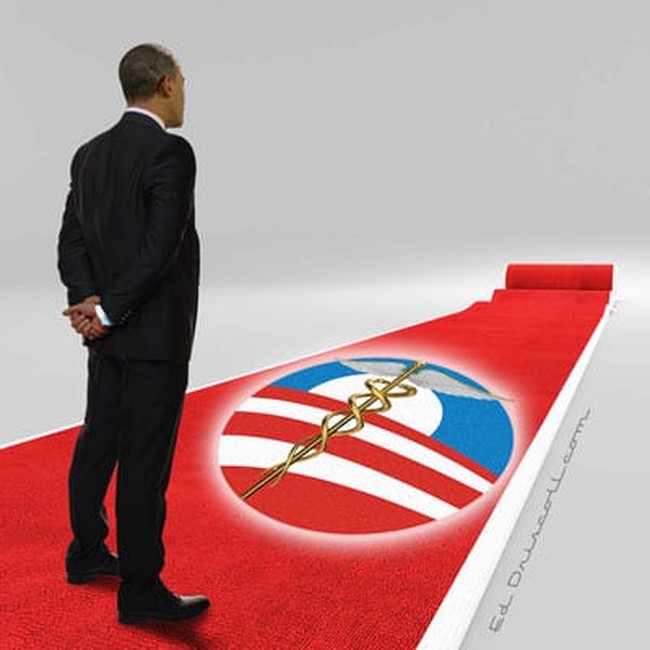This is the fourth and final part in a series of articles on the rollout of Obamacare and how the law will change our health care system. Each week in September, we have published two articles — one on the changes in medicine and medical care and one on changes in the insurance industry. We hope this series of articles will help you make better decisions when it comes to your health care and how you buy insurance.
The first three articles in this series discussed the rise of government-controlled Big Medicine, how this will affect patient care, and how electronic medical records facilitate Big Medicine.
This final piece will discuss how patients can best protect themselves from Big Medicine.
For now, ObamaCare is the law of the land. This won’t change in the immediate future. In the meantime, concerned Americans can still take some steps to protect their ability to receive good medical care. This includes the following:
1) Take control over your health spending.
Under ObamaCare, the government will be responsible for the majority of U.S. health spending. Hence it will inevitably seek to control your health care. To regain control over your health care, you must regain as much control as possible over your health spending.
For many people, an excellent option is a health savings account (HSA). HSAs are tax-free savings accounts where patients can deposit their own money to be spent later for medical needs. Most patients use HSAs for routine predictable expenses (e.g., flu shots, well-baby checks), coupled with a high-deductible insurance plan to cover unlikely-but-expensive serious accidents and illnesses.
Because patients with HSAs control their own medical spending, they and their doctors have greater control over treatment choices without requiring approval from government or private insurers. Patients with HSAs enjoy comparably good outcomes as patients with traditional insurance, while spending significantly less.
2) Find a doctor who will work for you.
More and more primary care doctors are establishing “concierge” practices. Patients pay an annual fee in exchange for guaranteed 24-hour telephone access and longer personalized consultation time for complex medical problems. Appointments typically run 45-60 minutes, as opposed to the hurried 10-15 minute appointments common in many overcrowded primary care practices. Most concierge physicians will also act as your advocate if you require hospitalization for a serious illness, coordinating your care with the various specialists based on his detailed knowledge of your full medical history.
“Direct pay” practices are similar, but without the annual retainer. Many post their prices and offer excellent service at a lower cost, because they can eliminate the insurance middleman.
Because you pay the physician directly, he is not beholden to the government or other third parties. Concierge and direct pay practices can be a win-win for both patients and physicians. Physicians spend more time with their patients and can practice according to their best medical conscience, for reasonable reimbursement. Patients receive higher quality care for a fair price.
Nor are concierge practices necessarily expensive. Some services are surprisingly affordable, costing approximately $150 per month — i.e., the cost of a daily latte at Starbucks.
Paying cash can also protect your medical privacy in the era of electronic medical records. New federal regulations allow patients who pay cash to request that the details of their medical care not be sent to insurance companies. Hence, this frees your doctor to concentrate on doing what’s best for you, without worrying that his treatment decisions might skew his practice statistics.
Direct pay can also work for more advanced specialty care as well. The Surgery Center of Oklahoma posts their prices for various surgical procedures. Their internal efficiencies allow them to achieve excellent clinical results, while charging less than under the traditional insurance system. As a result, they’ve been cited by the New York Times, ABC News, and MSN as a potential model for market-based health reform.
3) Be engaged in your own health care.
Under Big Medicine, doctors will be under increasing pressure to limit the number of expensive tests they order or the numbers of referrals to specialists outside their network. Doctors will be tracked to see if they are ordering “too many” costly MRI scans or sending “too many” patients to the superb out-of-network cardiologist across town instead of the adequate cardiologist “in network.” Conscientious doctors will still try to provide good medical care to all their patients. But they will naturally have to exercise some discretion over the tests they order and referrals they make.
You can help yourself by showing your doctor that you value your health. Stay engaged in your medical decision-making. Ask appropriate questions. Follow all reasonable treatment recommendations. If you demonstrate that you value and respect your own health, then he will be much more willing to use some of his limited latitude on your behalf. He’ll order that extra MRI scan (or make the extra referral), even it means staying late to write a letter to the accountable care organization administrator defending his decision.
On the other hand, if you treat your body poorly and disregard basic medical advice, your doctor will be far less likely to use his limited latitude on your behalf. If you don’t care about your own health, then why should he stick his neck out for you?
(Bonus tip: Treat the nurses and office staff with respect and courtesy. You want to be the patient that everyone enjoys seeing on their upcoming schedule, not the patient whose name makes them secretly cringe.)
4) Defend the morality of private medicine
Under ObamaCare, we’ll see an increasingly “two tiered” system of medicine. Most people will get their care from busy, overworked providers rushing to see as many patients as possible in short 10-15 minute appointments. Others will pay extra to enjoy longer 45-60 minute appointments with “direct pay” or “concierge” doctors. In many ways, it will be like the current two-tiered system of government “public” schools vs. private schools.
In addition to supporting private medicine economically, we must defend it morally. Just as many on the political Left attack parents who opt out of government schools to send their children to private schools, we’ll see increasing attacks on patients and doctors opting out of Big Medicine. They’ll argue that private doctors are worsening the current physician shortage, and not doing their “fair share” to help “society.”
Dr. Floyd Russak, a primary care physician in Colorado, explained his reasons for switching to a concierge practice:
It is morally wrong to practice inferior care… [I]t is just not practical to provide good care to patients in the current reimbursement model without maintaining a full-time practice of nearly 2000 patients, which requires 10-15 minute appointments to see everyone. Good care requires time, and with the overhead of a primary care practice running $200K/year per physician, time and reimbursement are at odds with each other….
I now practice a much more rewarding style of Internal Medicine, where I have time for the vastly improved care that comes with longer appointments and following my own patients wherever needed, including the hospital, office, home or rehab. Being on call all the time is not easy, but with only 300 patients, there are very few calls and most are appropriate and timely. I truly believe this is a better way to practice primary care medicine.
Dr. Joshua Umbehr of the Atlas MD concierge practice made a similar point in a recent interview:
As more doctors embrace this model, will there be a short-term market correction? Possibly, and that’s unfortunate. But this is the only viable model that will draw medical students and residents into the field of primary care.
The primary-care model offers hope to doctors who want to run their own family-medicine clinics. Otherwise, family medicine is dying on the vine — no one wants to do it when they can make more money and get more respect as a cardiologist or other specialist.
Could my model worsen the physician shortage short term? Possibly. Is it the best option we have for fixing the physician shortage in the long term? Absolutely.
As a patient, you should defend your right to spend your own money on your behalf according to your best judgment. And we should defend doctors’ right to choose their own practice model, seeing as many (or as few) patients as they consider appropriate, in order to give each patient the best possible care.
Big Medicine enters a new phase with the opening of the ObamaCare health exchanges on October 1. But Americans still enjoy significant health freedoms. We should take advantage of them while we still can, even as we work towards the eventual goal of repealing ObamaCare and replacing it with genuine free-market health care reforms.
Previous articles in this series by Paul Hsieh:
The Eyes of Big Medicine: Electronic Medical Records
How Big Medicine Will Affect Patient Care
Your Future Under Obamacare: Big Medicine Getting Bigger









Join the conversation as a VIP Member